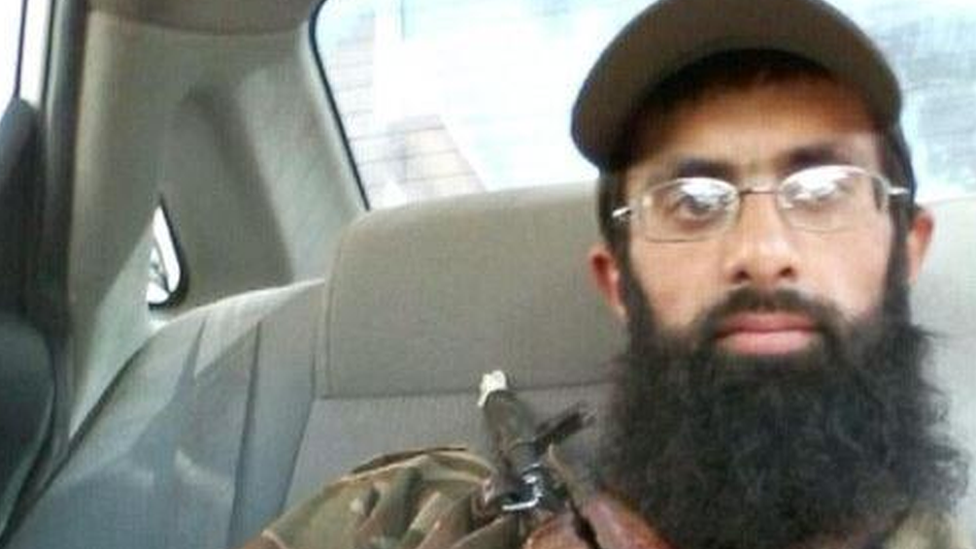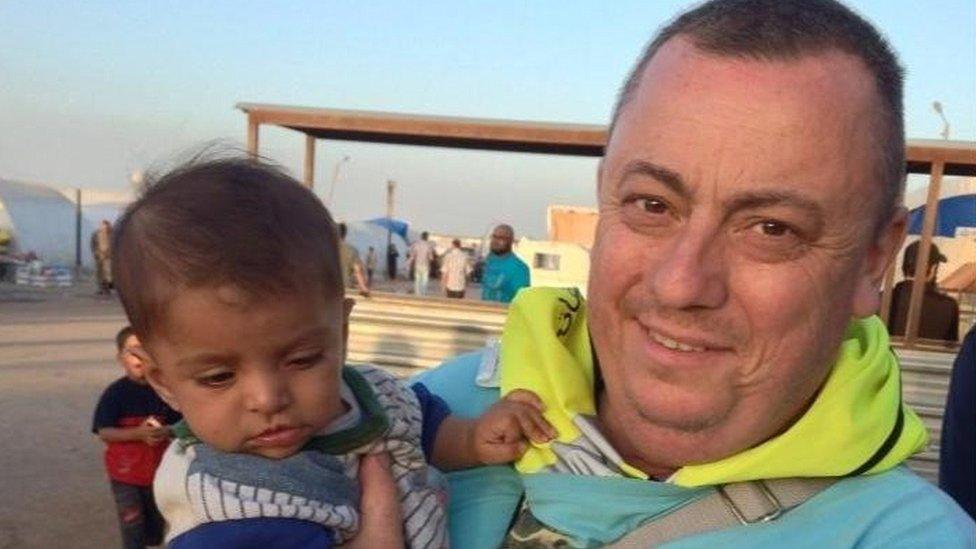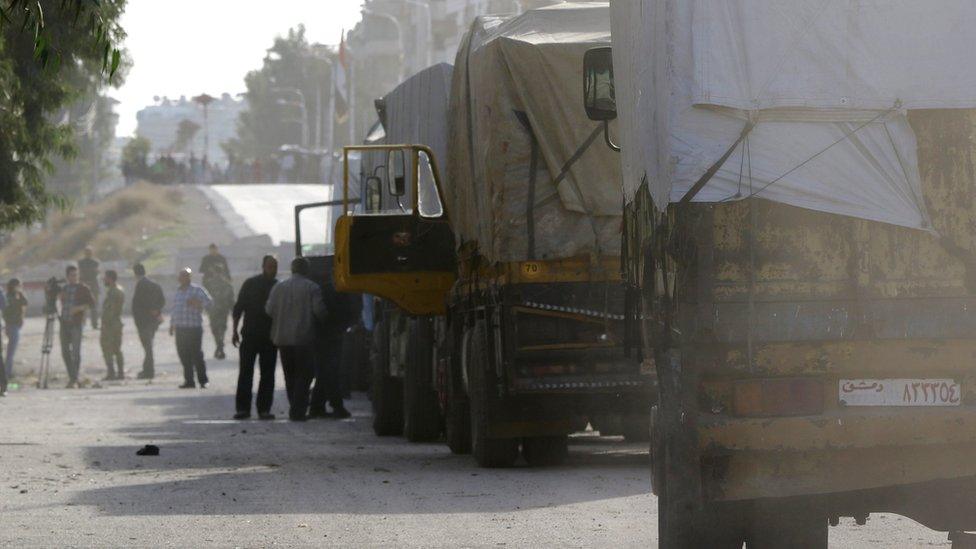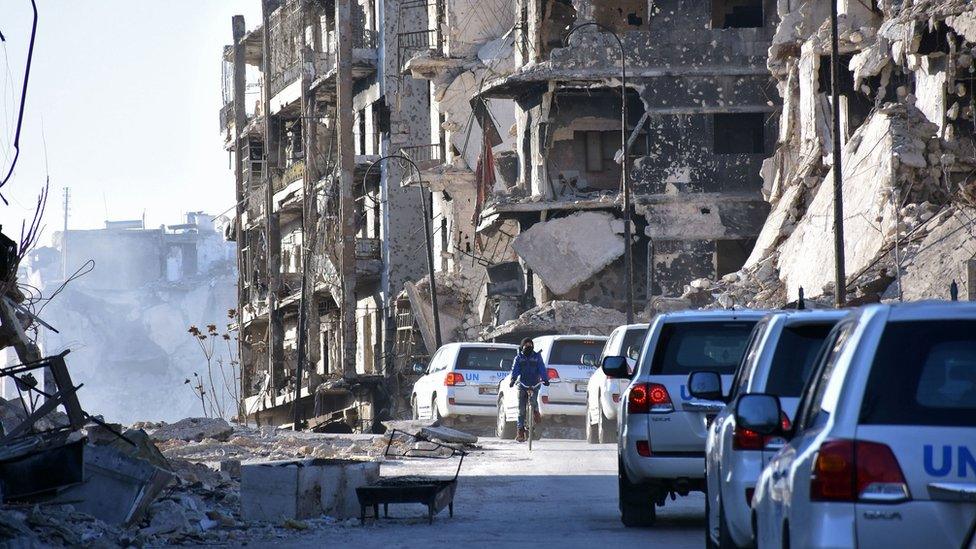The trouble telling aid workers and foreign fighters apart
- Published

Omar Hussain travelled to Syria after posing as a charity worker
It should be easy to tell the difference between an aid worker and a jihadist, but the war in Syria shows that is not always the case. Finding a solution could help ensure aid still reaches the people who need it in future conflicts.
A desire to ease the suffering of ordinary Syrians during its years of civil war has been shared by many people around the world.
But getting aid into Syria and making sure it reaches the right people is extremely difficult.
The conflict is complex and jihadists took advantage of the ensuing confusion - particularly at the start of the war - with some aid money diverted and foreign fighters entering the country by posing as aid workers.
Charities and aid have been exploited by extremists in previous conflicts - in countries from Bosnia to Afghanistan.
So, how can they be stopped from doing so in future?
In Syria, research by the Lowy Institute shows how extremists have often portrayed themselves as champions of the oppressed, external, with many claiming to be working with children and orphans.
Among them was Briton Omar Hussain, who travelled to Syria in 2014 and became an active voice in social media propaganda for the Islamic State group.
Believing that he was being monitored by MI5, he posed as a charity worker who was interested in helping orphaned children.
Another problem for UK security services was posed by aid convoys which, in the earlier days of the conflict, found it easy to drive through southern Turkey's porous border and directly into northern Syria.
While most of these ventures were legitimate, checks on the people that joined them - or even their intentions - were lax.

Alan Henning was kidnapped by IS militants after crossing into Syria with other aid workers
Two men who exploited the Muslim community's desire to help people suffering as a result of the war were Syed Hoque and Mashoud Miah, who used aid convoys to transfer money to Hoque's nephew - a jihadist who had asked for help buying a sniper rifle.
One of the unwitting convoys the pair used included Alan Henning, the Eccles taxi driver later kidnapped and murdered by militants from IS.
Another convoy was joined by Abdul Waheed Majeed, a 41-year-old father of three, who became the first British suicide bomber in Syria, when he drove a lorry bomb into the gates of a prison.
So concerned were the authorities that by February 2014 the UK Charity Commission issued a warning that aid convoys may be abused for non-charitable purposes.
You may also be interested in:
Similar deceits were used by Australian jihadists, who knew that they could escape prosecution if they could show they were doing humanitarian work.
Abdul Salam Mahmoud, external, for example, appeared on Australian television from Syria in August 2014, claiming that he was providing humanitarian aid and denying membership of any extremist groups. He was later claimed as a "martyr" by a group affiliated to al-Qaeda.
France also made arrests of charity workers it suspected of providing support to extremists.
Such exploitation of the aid sector is a difficult thing to police.
In democracies people are free to decide who they want to help and how to do that.

There is also a serious challenge posed by informal ways of moving money in and out of countries. For example, the hawala system of using agents in other countries to deliver money makes it difficult to keep track of cash being moved across borders.
Worryingly, the amounts needed to carry out attacks are small.
Remote-controlled bombs, for example, can be built for a few hundred dollars.
While large international charities have the resources to carry out checks to ensure that money is going to the right people, their systems are not always foolproof.
And the ability of small groups to verify who actually received money, or aid, is often limited.
In the Turkish city of Gaziantep, close to the Syrian border, one representative of a Syrian aid organisation told me: "In Syria, without very careful checks, it is very easy to have someone give you a receipt, and a list of recipients with names and addresses, all of which are bogus."
Neither is it the case that funds reaching extremists is always deliberate.
Syrian charity workers in Turkey and Jordan told me that only after working with international organisations had they appreciated the importance of a paper trail and the need to check lists of terror suspects.

Current regulations targeting money transfers and the movement of people tend to be retrospective. These laws punish those who break the rules, rather than preventing problems from developing in the first place.
And while many countries provide training for groups operating in high-risk areas, not all effectively share information between their security services and charity regulators.
In future, governments may want to aim to stop exploitation of aid efforts before it takes place.
One option might be the "licensing" of groups who plan to operate in war zones, to ensure they have robust systems in place to know who is working with them and where money is going.
Another approach might be for governments to establish "declared areas" in high-risk countries - travel to which would be a criminal offence, except in a small number of circumstances.
Australia, for example, placed restrictions on travel to Raqqa and Mosul.
Each country will want to decide how it can best tighten up controls.
There is every chance that aid organisations will once again be targeted by extremists as conflicts develop in the future.
Syria shows us just how easily that can happen and why we should learn the lessons.

About this piece
This analysis piece was commissioned by the BBC from Rodger Shanahan, external, a research fellow on the West Asia Programme at Australia-based international policy think tank the Lowy Institute. Follow him @RodgerShanahan, external
His latest report is Charities and Terrorism: Lessons from the Syrian Crisis, external.

Edited by Duncan Walker